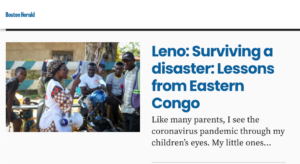
From the Boston Herald, May 10, 2020.
Like many parents, I see the coronavirus pandemic through my children’s eyes. My little ones were born in the United States, where there have always been groceries on the shelves, there has always been care for the sick, and they could always move freely around the country and the world. All that is suddenly in question.
As a former refugee and a lifelong humanitarian worker, I know that my children’s experience is far from universal. Abundant food, adequate medical care and freedom of movement are the global exception, not the norm. Living in conditions of fragility and scarcity is a profound misfortune, to be sure. But misfortune survived turns into enduring wisdom.
At this moment of global crisis, I want to share some simple ideas I have learned from a lifetime of partnership with people who have been through the unimaginable and survived.
Disaster is a part of life.
When I was growing up, my family and I spent 11 years as refugees in Guinea. That experience made me want to pursue a career in humanitarian work. Ever since, I have worked in one challenging place or another, from Darfur and South Sudan to Balochistan in Pakistan to the Democratic Republic of the Congo today.
Because of my experiences, I am never surprised by disaster. Neither are the people I work with in the DRC, where people have lived in a continuous crisis for a quarter century, from the civil war of 1996 to the present. These modern crises build on an even darker history of colonial exploitation.
Because of all the challenges they have endured, the Congolese people have a kind of unshakable confidence, even in the worst of times. Even though COVID-19 is a new challenge, people in Congo know the moon will still be there at night, and the sun will rise again.
Disaster is a part of human life, and we are never alone in it.
Humanity matters most.
A disaster, even a very long-lasting one, has a beginning and an end. We were human before it, and we will be human after the disaster too. During the disaster, then, we must take special care to protect our own humanity and the humanity of others.
Where I work in DRC, medical clinics will likely run out of protective gear, disinfecting supplies and even basic medicines before the pandemic has run its course. But even under conditions like those, doctors and nurses can and will provide space for patients to lie down in peace and safety. That may not sound like much. But in a crisis, dignity matters infinitely more than all the equipment in the world.
Humanity isn’t a luxury to be saved for times of peace and plenty. It is the most important form of disaster relief there is — and often the only one.
We can all be powerful.
Much of the suffering of an ongoing disaster comes from the feeling of powerlessness. People affected by emergencies have no choice but to depend on the care of others.
Powerlessness leads to despair. But even and especially in disasters, people can and do find ways to exercise their own power, and help others do the same.
Sometimes, it is an act of power to go to work. All over the world, medical workers are putting their lives on the line every day. (In Congo, COVID-19 is just one of the dangers they face. Last year, armed groups attacked health workers fighting the Ebola epidemic more than 300 times.) Beyond health care, workers all around the world are building power every time they make a delivery or clean a toilet. In using their power to do do their jobs, these workers are giving the rest of us the power we need to get through the pandemic.
No matter who you are, you have power in a disaster — to show up, to help out, to be kind. And every time you use your power, you are helping others become more powerful too.
You can still have joy.
Prolonged disasters make living hard. The feeling of powerlessness, the loss of dignity and the cheapening of human life can make any of us wonder whether life is worth living. But over a lifetime in challenging places, I have seen people find their most sustaining reasons for living when living is hardest to bear.
No matter how hard things are, you can still find joy among the hardship. It is always OK to dance.
Abraham Leno is executive director of the Eastern Congo Initiative, a nonprofit organization that is helping the people of the Democratic Republic of the Congo.
